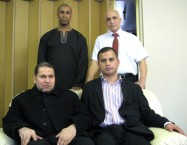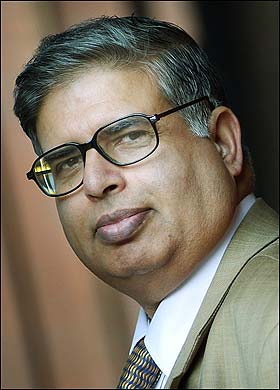“I don’t much care if people think I’m thick because I believe in God. But what’s really nasty here – and it’s a part of a growing phenomenon – is the way religion is being used as a subtle code for race.
“Belief in God is alive and well in Africa and in the Middle East and declining in western Europe. Writing about the intelligence of religious believers has, for some, become a roundabout way of commenting on the intelligence of those with darker skins whilst seeking to avoid the charge of racism. Religion is being used with a nod and a wink, cover for some rather dodgy and dangerous politics.
“The BNP, for example, has started using religion as a category of racial designation so as to deflect charges of racism. For instance, they seek to defend something called ‘Christian Britain’. But what they really mean is ‘no Muslims’ – and that really means ‘no Asians’. The fact that these categories are not in any way equivalent does not detract from the message the BNP is sending by using them in the way they do….
“The debate between believers and non-believers – a debate that gets terribly hot on this site sometimes – is not made any more civil by the addition of this unpleasant inflection. Which is why believers and unbelievers (even those who think people like me are idiotic enough to have given their life to the great flying spaghetti monster) ought to unite against this way of thinking about our differences. ”
Giles Fraser at Comment is Free, 12 June 2008

 “Last week I was at Southwark Crown Court to observe the harrowing trial of Brian Donegan who last August launched a vicious unprovoked attack on the Imam of Regent’s Park mosque, Sheikh Mohammed El-Salamouni. Sheikh El-Salamouni was left lying on the floor of the mosque with horrific injuries and is now blind for life. In its symbolism to those in the Muslim community, the attack would be comparable for Roman Catholics to an attack on an archbishop at Westminster Cathedral. To add to the local community’s distress, the fall-out from the attack is that Imams from Al-Azhar University who have provided us with the Imams at Regent’s Park for many years could now leave London if the Egyptian authorities do not feel they will be adequately protected in London.
“Last week I was at Southwark Crown Court to observe the harrowing trial of Brian Donegan who last August launched a vicious unprovoked attack on the Imam of Regent’s Park mosque, Sheikh Mohammed El-Salamouni. Sheikh El-Salamouni was left lying on the floor of the mosque with horrific injuries and is now blind for life. In its symbolism to those in the Muslim community, the attack would be comparable for Roman Catholics to an attack on an archbishop at Westminster Cathedral. To add to the local community’s distress, the fall-out from the attack is that Imams from Al-Azhar University who have provided us with the Imams at Regent’s Park for many years could now leave London if the Egyptian authorities do not feel they will be adequately protected in London. “The Muslim Council of Britain joins human rights groups, a growing body of thinkers and policymakers dealing with our security, together with a large proportion of the British public who oppose the extension of pre-charge-detention. Any further extension of pre-charge detention risks being counterproductive, damaging community relations and undermining the UK’s moral authority around the world. We oppose terrorism in all its forms. We are all concerned about the right to security, free from terror, but this proposal serves to compound the problem, not resolve it.
“The Muslim Council of Britain joins human rights groups, a growing body of thinkers and policymakers dealing with our security, together with a large proportion of the British public who oppose the extension of pre-charge-detention. Any further extension of pre-charge detention risks being counterproductive, damaging community relations and undermining the UK’s moral authority around the world. We oppose terrorism in all its forms. We are all concerned about the right to security, free from terror, but this proposal serves to compound the problem, not resolve it. “Britain’s top Muslim [sic] last night praised Gordon Brown and demanded MPs back new laws to hold terror suspects. Khurshid Ahmed, chairman of the British Muslim Forum, the UK’s largest representative Muslim organisation [sic], called for 42 days’ detention without charge. He said it was vital to protect the nation.”
“Britain’s top Muslim [sic] last night praised Gordon Brown and demanded MPs back new laws to hold terror suspects. Khurshid Ahmed, chairman of the British Muslim Forum, the UK’s largest representative Muslim organisation [sic], called for 42 days’ detention without charge. He said it was vital to protect the nation.”